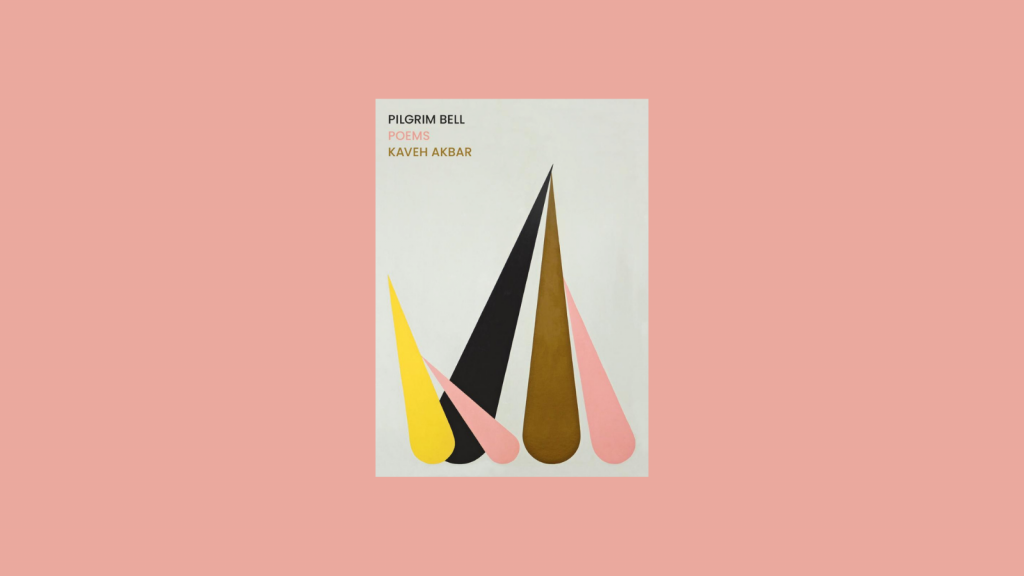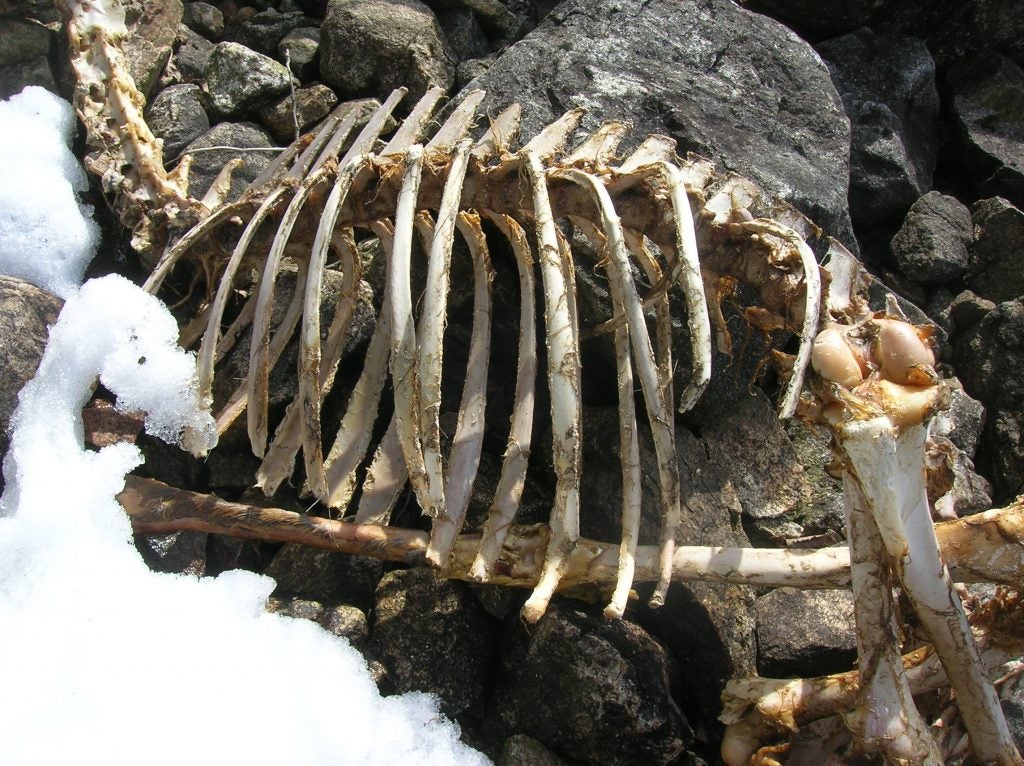In Pilgrim Bell, stories are crumbling, words falling where they are. A god appears, is created, unravels, man is left with “dew” on his hands. A poem is written with all of the words backwards. This second collection by poet Kaveh Akbar follows a doubting speaker: holy, human, violent, and profane; a speaker who is reconciling the empire, himself, and the immaculate divine.
According to his website, Akbar is an Iranian-American poet and scholar. He is Poetry Editor at The Nation and author of the collection Calling a Wolf a Wolf.
In his newest collection, the speaker’s memories of family appear alongside lush imagery. In the poem “Reza’s Restaurant, Chicago, 1997,” Akbar writes: “my father who wore only black even / around the house whose umbrella / made it rain whose arms could / cut chicken wire and make stew and / bulged with old farm scars.” The speaker’s father appears in other poems, such as the piece “My Father’s Accent,” where he writes: “Sometimes he bites his bottom lip to suppress / what must be / rage. It must be rage / because it makes no sound.”
Though there are mentions of the speaker’s mother, such as in the poem “Cotton Candy,” there is also a piece on Mothers titled: “Mothers I Once Was.” Perhaps the most abstract piece of the collection, the lines are reminiscent of a sonnet with rhyming and word-play that give the piece an almost nursery-rhyme sound. This can be clearly seen in the first stanza:
Mother fingers in the mud. Mother begging bowl. Mother lace-weaver drumming her web, babies eating her whole. Bleachable mother. Mother apron smeared with flour. Mother flower. Mother Florida.
The poem also uses anaphora by repeating metaphors for a mother, “Mother was wrong. Mothersong. Our Lady Mother of Wet Beds / and Aggressive Disgrace. Mother persimmon, name sounds / the way she tastes.” Ending in a rhyming couplet: “Mother with all of creation fattening. / Mother who held on while it was happening.” Though it is unclear, the role of Mother in the piece is almost that of a preposition. What it is to be the mother of the metaphor. The poem contains allusions to mother as domestic, mothers in nature, and mother as a religious term.
In many poems, the body appears in grotesque forms, often accompanied by Satan or god. In the poem “Vines,” he writes, “when I saw God / I trembled like a man I used the wrong pronouns / God bricked up my mouthhole / his fists were white as gold there were / roaches in my beard.” In some poems, where there is something sacred or holy, Akbar pairs it with its opposite. “Like an ocean coughing up trash,” he writes in the poem “Against the Parts of Me that Think They Know Anything,” “I’m squeezing God / out from my pores.” The collection offers more than agnosticism, often looking at the body as a room or a space where the divine should be, but he cannot find him. When God does appear, he encourages fear rather than comfort. Akbar describes the devil crawling through Adam’s body, out of his anus, in the poem “My Father’s Accent,” writing, “he knows his job will be easy, a human is just one desperation / to be filled.”
Towards the middle of the collection, there is a poem titled “Shadian Incident,” whose subtext tells the reader about the 1975 attack by the People’s Liberation Army on the city Shadian where “one-thousand Hui were killed and more than four-thousand homes were destroyed.” The piece begins with a haunting image of a flower, Akbar writing: “I knew them when they were just / geraniums.” The rest of the poem is soft and quiet, taking place after the attack, processing what has been lost: “there is dust / where there should / have been men air / where there / should have been / men.” In another line, he writes, “the mosque / loudspeaker groans down to the / children or at least down to/ their beds empty today.” Later, Akbar quotes a line from the Quran alongside a description of how the army made the Muslim men wear pigs heads around their necks. The holy text states: “action / will be judged according / to intention,” a line that could speak to every soldier, every man, every child.
In addition to history, the divine, and stories from sacred texts, the speaker also wrestles with empire. In the poem “My Empire,” the speaker says, “My empire made me happy / because it was an empire, cruel, / and the suffering wasn’t my own.” He also describes what empire means to his immigrant father, writing in the poem “Reading Farrokhzad in a Pandemic,” “people die because they look like him.” Towards the end of the poem, the speaker admits: “I want both my countries / to be right / to fear me.” The violence of America continues throughout the collection, with mentions of drone strikes, graves, and piles of rubble.
The collection also features a series of six poems from which the book derives its title, “Pilgrim Bell.” In these, there are examples of prayer and doubt. In one of the poems, Akbar writes, “My savior has powers and he needs. / To be convinced to use them. / Up until now he has been. / A no-call no-show.” Another explores the speaker’s thoughts in a stream of consciousness, “I am so vulnerable. / To visionaries. / And absolute. / Certainty.” This last poem of the series ends: “Tell me how to live. / And I will live that way.”
The first time I encountered the collection’s closing poem, “The Palace,” I was in the basement of a small bookstore outside of Boston, pre-pandemic. There were rows and rows of poets, shoulders joined, poets I knew and some I didn’t as a film crew recorded Ilya Kaminsky and then Kaveh Akbar, reading. Halfway through the piece, he recited, to a silent room, “Are you still listening?” That night my partner taught me the term “volta,” an Italian word which the Poetry Foundation describes as a turn, traditionally used in sonnets.
“The Palace” contains multiple voltas, with images of empire flashing alongside memories of violence and family. He writes: “There are no good kings. / Only beautiful palaces.” America is a boy wearing a t-shirt that proclaims, “We Did It to Hiroshima! We Can Do It to Tehran!” America is an immigrant father, coughing up duck feathers on a couch. America is “life/ growing monstrous / with ease.” The poet writes, “the dead keep warm under America.” The images in “The Palace” are unforgettable. The reader follows the speaker at each turn, unaware of when to breathe.
Lush, palpable, and hauntingly ethereal, Pilgrim Bell is a collection to keep nearby. Many of its poems feel new with each reading, so may we sit with empire, our bodies, and God, walking across the borders of power, both tangible and spiritual, and journey with the speaker.






